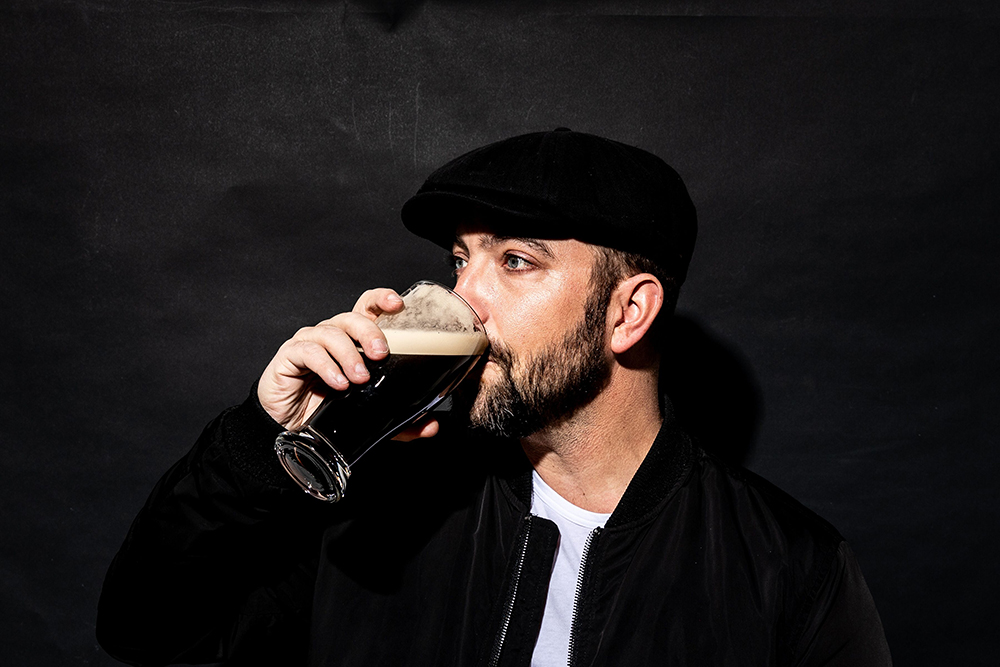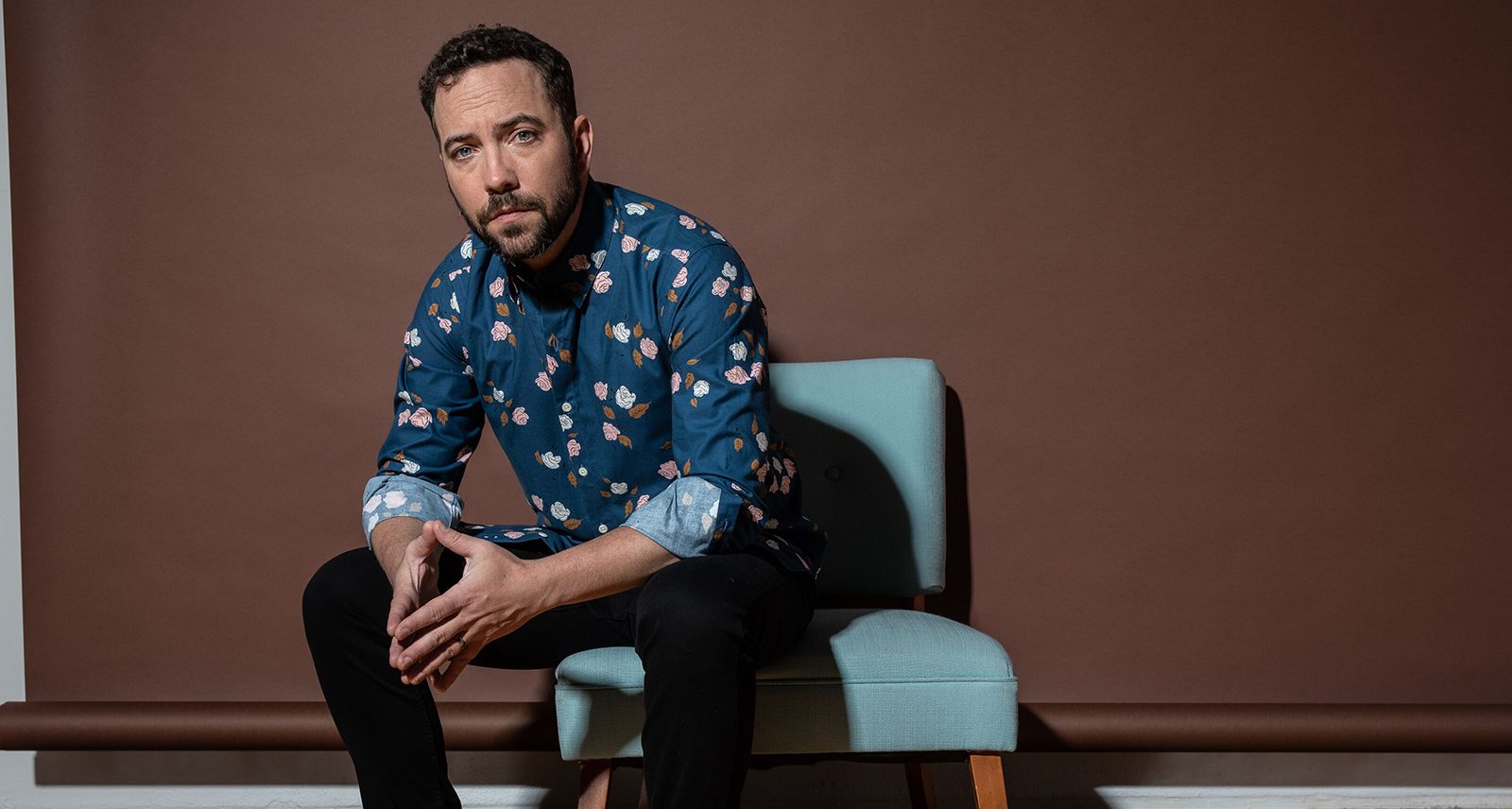Justin Rutledge is a man in transition. Fresh off marrying HGTV host Sarah Keenleyside last year and welcoming a son in July, the Toronto alt-country auteur has been moving through a lot of new passages. He’s also just released his eighth album, named — what else? — Passages. His first major autobiographical work, the record tackles the struggles and triumphs the Juno Award winner has experienced in his life thus far — and with a career spanning over a decade, there’s much ground to cover. For a man whose work has primarily dealt with fictional characters, this is a big deal. Backed by a new band that includes the Tragically Hip’s Rob Baker, you can hear the 40-year-old’s many joys and pains amid the album’s densely layered and ambient soundscapes.
Ahead of Rutledge’s cross-Canadian tour, he opened up to us about penning more personal songs, collaborating with iconic Canadian author Michael Ondaatje, and the continued influence of the Hip.
You’ve said in the past that you normally write more about fictional stuff when you’re creating music. This album was much more personal. What’s that shift like?
Well, I guess in a sense it’s slightly easier. I guess it stems from my younger years as an English major in university — you know, I was really intrigued by works of fiction and the freedom that allows. So in the past I just sort of created various scenarios and characters in my head and really ran with them. It’s almost like writing a work of fiction. But there’s a bit more weight when you set out to write something that really is about you or someone you know or love. This is personal. I find that it almost becomes more difficult because there’s more pressure within myself to do justice to the subject. It takes a little longer. You want to get things right. On Passages, I really did want to write a song for my wife, which is the title track. And then I really did want to write a song about good man; it’s about a friend of mine that has dealt with some difficult situations in the past. And then I wanted him to hear a certain level of accuracy and identity in that song, lyrically. It was quite the creative task.
You married your wife last year and the title track of the album ended up being about her. Was that something you planned right from the start, or did it happen organically?
No, not at all. I just started writing that song about three years ago and I liked the title — what the word symbolized. It wasn’t intended to be the title track at all, but I did feel as though, at least at this stage in my life, the word “passages” resonated with me. I’m a fan of one-word album titles. But I just thought it reflected where I’m at creatively and where I’m at in my own life. I just got married and just had a kid. I feel as though certain doors — you know, they’re not closing but they’re ajar and two other bigger doors have been opening. So, there’s this sense of closure and reentry into a new space. These spaces are new chapters. I think about life as a series of paragraphs. There are passages in this book that we’re all living.
Would you say the experience of writing an album based on personal life experience was mostly positive, or did it take you to any darker places?
There were times where when I didn’t want to write. I didn’t want to go to the places that I was required to go to when you write songs like that. So, there’s a very high level of frustration. And usually when I go into recording, I have about 15 songs that I’m going to make a 10-song album out of. This time around I think I only had eleven. So that just goes to show that I had to spend more time internally having those discussions with myself about the songs — about finding the right words. Creatively it was a little bit more of a minefield than I had anticipated. So yeah, I might not do it again for the next record, but we’ll see. When I’m writing fiction, I do like hiding behind the masks of other characters in other situations. But it’s nice to put yourself out there and to also let your fans know who you really are.
You mentioned you were an English major. You’ve collaborated with Michael Ondaatje in the past and you collaborated again with him on this album. What was that like?
Well, Michael is probably the most creative person I know. It’s very beautiful, the cerebral way that great minds and novelists work. And the song that I put on this record that him, it was an older song we worked on together in I think 2011 but I didn’t finish up until now. So, I had a few songs that I was especially stumped on lyrically, and as opposed to going to a colleague or fellow songwriter, I decided to go to one of the best writers that I’ve ever met. I went over to his place one afternoon and I had three songs that I was stumped on lyrically. It took about an hour to bang them out. I mean, the man’s relationship with words is unparalleled within the circles I know.

You also collaborated with The Hip’s guitarist Rob Baker. What was it like working with him?
Oh, it was amazing. Rob is such a sweet guy. And talk about a man that lives and breathes media. I mean, we struck up a relationship in 2014 when I decided for my next album to do an entire record of Tragically Hip covers. It’s called Daredevil. I reached out to the band just to let them know what I was doing and get their okay on it. I e-mailed Rob through a friend and it turned out that he’d had a few of my records and he was a fan of my music. I was living in Prince Edward County at the time and he lives in Kingston. So we decided to meet up for a coffee; I drove to Kingston, we hung out one afternoon, and we hit it off really well. That was the genesis of a really great friendship. So when I went to record Passages, I thought I’d drop him a line and ask if he wanted to play on a couple of songs. He expressed interest in playing on the entire album! So that’s the way it worked out. He came to Toronto, we tracked live with the band, and it was great. He approaches everything with such a level of professionalism, but also curiosity. And still after all these years — I mean 30 years of being in The Tragically Hip and being a full-time musician and being such a road warrior — he does not rest on his laurels. He still approaches things as though the song is new.
As you mentioned, you did that whole album of Hip covers. How would you say their work has influenced you? Was there any of that influence in Passages?
Definitely when I first heard them I was really into poetry and books and literature. And when I heard Gord Downie writing the way that he wrote, it was almost like he opened up a door in my mind. You know, he and Leonard Cohen used words and music in a way that I’d never heard before. It really deepened the longing and need to create that way; to use music as a backdrop for something really brave lyrically. So, I’ve always aspired to be like him. And I think a lot of us, as Canadians, can attest to them being the soundtrack to our youth and our lives. I mean, just going through what this country has been through with the passing of Gord, and the final tour of the Hip, having Rob on this record is special to me. Just having him as a part of the band recording off the floor… I mean, he’s an incredible guitar player and he’s got such a classic Hip tone, so that influenced the way that was recorded and the input into the album was invaluable. It would be a totally different album had he not been on it.




